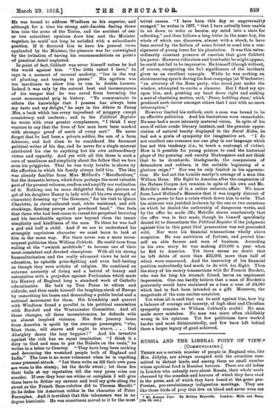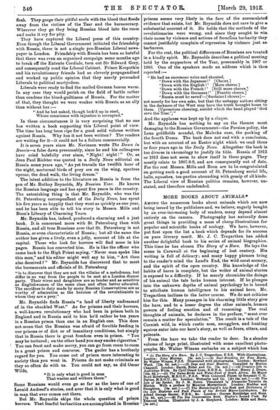RUSSIA AND THE LIBERAL POINT OF VIEW.*
• [COHMUNICATED.]
THERE are a certain number of people in England who, like Mrs. Jellyby, are always occupied with the atrocities com- mitted in distant lands, and among them no small number whose spiritual food is Russian horrors. There are old ladies in London who actually rave about Russia, their whole' souls obsessed by the scandals and horrors of which they have read in the press, and of which they have heard at the great pro- Persian, pro-revolutionary indignation meetings. They are like those birds of prey that live on blood and never even eat
• Hy Busman
Year. By Rothay Reynolds. London Mils and Boon.
flesh, They gorge their pitiful souls with the blood that floods away from the victims of the Tsar and the bureaucracy. Wherever they go they bring Russian blood into the room and make it cry for pity.
They have captured the Liberal press of this country: Even though the Liberal Government initiated the friendship with Russia, there is not a single pro-Russian Liberal news- paper in London. Friendship with Russia has been so hateful that there was even an organized campaign some months ago to break off the Entente Cordiale, turn out Sir Edward Grey, and consequently rend the Liberal Cabinet. Prince Kropotkin and his revolutionary friends had so cleverly propagandized and worked up public opinion that they nearly persuaded Liberals to political martyrdom.
Liberals were ready to find the mailed German bosom warm. In any case they would perish on the field of battle rather than condone the blood-guiltiness of Russia. For the matter of that, they thought we were weaker with Russia as an ally than without her
And he but naked, though lock'd up in steel, Whose conscience with injustice is corrupted."
In these circumstances it is very surprising 'that no one has written a book supporting this Liberal point of view.
The time has long been ripe for a good solid volume written against Russia. Why has it not been written ? The readers
are waiting for it—it could not be a failure commercially.
It is seven years since Mr. Nevinson wrote The Dawn in Russia—a false dawn presumably, since be and his colleagues have cried balefully ever since, "Night! night ! " Or, as Jean Paul Richter was quoted in a Daily News editorial on Russia some years ago, "As yet travails the twelfth hour of the night, nocturnal birds of prey are on the wing, spectres uproar, the dead walk, the living dream."
The latest addition to the literature on Russia is from the pen of Mr. Rothay Reynolds, My Russian Year. He knows the Russian language and has spent five years in the country. The astonishing thing is that Mr. Reynolds, who was the St. Petersburg corresporMent of the Daily News, has spent his five years so happily that they went as quickly as one year, and he has been able to tell his story in Messrs. Mills and Boon's Library of Charming Years.
Mr. Reynolds has, indeed, produced a charming and a just book. It is concerned more with St. Petersburg than with Russia, and all true Russians aver that St. Petersburg is not Russia, or even characteristic of Russia; but all the same the author has given a lively, even a jolly, account of life at the capital. Those who look for horrors will find none in his pages. Russia has converted him. He is like the officer who came back to the High Priest saying, "Never man spake like this man," and his editor might well say to him, "Art thou also deceived ?" Mr. Reynolds has discovered that to meet the bureaucrats and officials of St. Petersburg "is to discover that they are not the villains of a melodrama. but differ in no way from the people to be met at a London dinner party. Their wives and daughters are as tender and as sensitive as Englishwomen of the same class and often better educated. The sacrifices to duty made by many Russian Conservatives are as worthy of admiration as the heroism of the revolutionists to whom they are a prey."
Mr. Reynolds finds Russia "a land of liberty nndreamed of in the shackled West." As for prisons and their horrors, a well-known revolutionary who had been in prison both in England and in Russia said to him he'd rather be ten years in a Russian prison than one in an English one. This does not mean that the Russian was afraid of forcible feeding in our prisons or of dirt or of insanitary conditions, but simply that in Russia there is great freedom even in prison. "You may be tortured ; on the other hand you may smoke cigarettes." You can feast and make merry, you can go from room to room in a great prison and converse. The gaoler has a brotherly regard for you. You come out of prison more interesting to society than you went in. Prisons do not make criminals as they so often do with us. You could not say, as did Oscar
Wilde, "It is only what is good in man
That wastes and withers there."
Some Russians would even go so far as the hero of one of Leonid Andreers stories, and aver that it is only what is good in man that ever comes out there.
But Mr. Reynolds skips the whole question of prison horrors. That fearful barbarities are accomplished in Russian prisons seems very likely in the face of the accumulated' evidence that exists, but Mr. Reynolds does not care to give a. substantial account of it. Be holds that the methods of the revolutionaries were wrong, and since they sought to win, their cause by violence and actions of ferocious barbarity they cannot justifiably complain of repression by violence just as barbarous.
For the rest, the political differences of Russians are treated in a kindly spirit. Mr. Reynolds describes a political meeting held by the supporters of the Tsar, presumably in 1907 or 1908. One of the speakers made an address which is thus reported :—
"Ho had an enormous voice and shouted,
Down with the Japanese!' [Che3rs.] 'Down with the English !' [More cheers.] 'Down with the French !' [Still more cheers.] 'Down with the Germans !' [Frantic cheers.] 'Russia must b3 saved'—iSustainel ch3ers]— not merely for her own sake, but that the unhappy nations sitting.
in the darkness of the West may have the truth brought home t,a them. [Uproarious cheering, amidst which the band played God save the Tsar.']"
And the applause was kept up by a claque.
3fr. Reynolds has nothing to say on the themes moss damaging to the Russian Government—the Persian policy, the Lena goldfields scandal, the Malecka case, the packing of the fourth Duma. The book does not end with a conclusion, but with an account of an Easter night which we read three
or four years ago in the Daily News. Altogether the book is too diverse in Chronology to justify its title. Russia of 1912. or 1913 does not seem to show itself in these pages. They mostly relate to 1907-8-9, and are consequently out of date. For the rest Messrs. Mills and Boon are to he congratulated. on getting such a good account of St. Petersburg social life, balls, squashes, tea-parties abounding with gossip of all kinds TheLiberal view of Russian polities remains, however, un- stated, and therefore undefended.











































 Previous page
Previous page